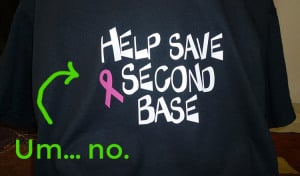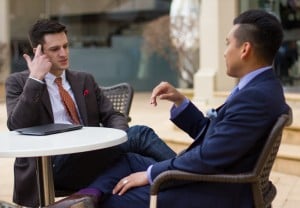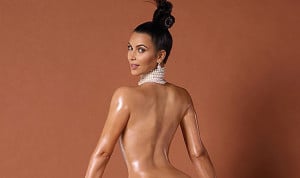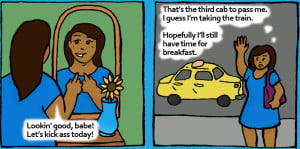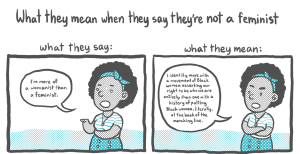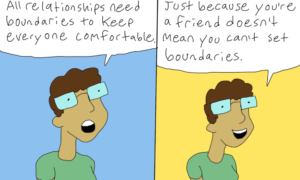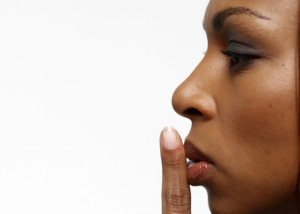
Source: Southside Business
Single women, simply because they don’t have or don’t want a boyfriend, are subject to a particular kind of disrespect in American society.
Whether it’s mean-spirited jokes, negative assumptions, or harassment, being single is considered a poor choice or an unfortunate condition for American women (at least women who fall within the societal standard of acceptable womanhood).
Our poor treatment of un-partnered women is rooted in misogyny — we still value a woman’s relationship (particularly with a man) over many other things in her life.
This is so pervasive that it evens happens in queer communities. Queer women are also pressured to “settle down” or are only accepted if their queerness follows a predictable path (like having a life partner and a couple of gaybies).
We need to ease up on the expectation that women should conduct their romantic lives in a particular way. Demanding a woman’s romantic life to follow a certain set of expectations is another way of saying “I know what’s good for you better than you do.”
We can most certainly do better by single women — both those who are single by choice and those who would like a partner (or several).
In order to truly eradicate this prejudice, we need to tackle the patriarchy. But to start, here are ten things you shouldn’t say to single women — please.
1. “So, You’re a Career Woman?”
Don’t make assumptions about why a woman is single.
Kaye, a straight white woman in her twenties, wishes people wouldn’t assume that just because she’s single, she’s “a career woman.” She works in a field with demanding hours and isn’t already married, so she says many people assume she’s chosen work “over” a partner.
It’s absurd to think that women come in two kinds — those who care about their work and those who care about relationships.
The assumption that a woman who is currently focusing on her career has no romantic or sexual desire is ridiculous (unless she actually is asexual or aromantic).
There have been a flurry of articles published recently on whether or not women can “have it all.” Some argue that it’s possible to balance work and family, and some argue that it’s impossible to do everything in one lifetime considering the conditions of this country.
Regardless of what you personally believe to be the truth, women like Kaye just want people to stop assuming they’ve made a choice without even talking to them about it!
For her, it isn’t a dichotomy. Her career is incredibly important to her, but she has no problem balancing it with a relationship when the right one comes along.
Women may be single for a variety of reasons. Don’t assume you know why.
2. “You Must Be Divorced”
Don’t play detective when you’re talking to a woman about her relationship status.
Patricia, a straight, white woman in her sixties, says that “people…are not satisfied in hearing that you are single and have to know if you are divorced.”
Patricia has lived on this planet for sixty-plus years, and her proudest achievements have nothing to do with the men she has dated.
The fixation on her relationship status is condescending. It says “I don’t care what’s important to you. What interests me most is who you have dated.”
Furthermore, whether or not someone has a partner can be private information. It can be a source of pain or embarrassment, or it can be something a woman simply doesn’t want to talk about.
In addition to the people who are simply wired to view relationships as private, many women feel the need to stay mum on the topic of their relationships because of the judgment they are likely to receive if their relationship doesn’t fit the standard model.
When Mitt Romney, a presidential candidate, was debating President Obama in the 2012 presidential debate, he implied that single mothers are the cause of gun violence. It’s not for nothing that single women would sometimes rather keep their mouths closed about their relationship status.
Sometimes, there’s an element of racism in these types of comments, and that’s doubly not okay. One woman I talked to said, “I hated when people used to say ‘I thought your people married young’ or ‘You don’t have any children? That’s unusual for Latinas.'”
Resist the urge to hold single women to subjective standards about how they should be living their lives.
You never have all the information about why a woman is making the choices she is making. She is the captain of the ship, so to speak. She knows what works for her and why she wants things to be the way they are.
Prying about a woman’s relationship status or the reason she is single is boundary-crossing behavior. Don’t do it.
3. “You’d Be More Attractive If You…”
Sarah, a queer, white woman in her forties, says if one more man tells her to “smile,” she may stop smiling forever.
Rivka, a straight, white woman in her twenties, has a brother who told her, “Don’t worry! You could get a guy if you wanted. You’re an eight when you put make-up on.”
This should be obvious, but it’s not: Her body, her rules.
A woman looks that way because she has chosen to, and it’s her decision whether or not she wants to change her look or put on a smile to attract a partner.
Overwhelmingly, the women I talked to wanted people to stop assuming they could “fix the problem.”
Jay pointed out that there’s an element of patronization, of “the assumption that women are supposed to be passive recipients of desire, to be pursued” in this kind of advice. “We don’t tell people ‘a job will come when you stop looking’ or ‘friends will come when you stop looking’ or ‘social justice will come when you stop looking.'”
Physical appearance should not be currency.
Unfortunately, it is, and it’s especially insidious for women. Single women who don’t conform to your ideas of beauty are already swimming upstream in a culture that privileges a certain kind of beauty.
We should be making room for this kind of variety, not trying to force everyone to continue to uphold this narrow and exclusionary beauty ideal.
4. “Listen to Me — You Don’t Need a Boyfriend”
Eva, a queer woman in her thirties, wishes people wouldn’t tell her that “being picky is a good thing” when she complains about being single.
It can be tempting to bust out the common wisdom or the platitudes when talking to a single woman about her relationship status, but check in with her instead.
She will be able to tell you how she wants to be supported.
Women, for the bulk of history, have been met with suspicion or arguments when they express distress. Take, for example, the widely held bias held by medical professionals against medicating pain in women.
For this reason, it is imperative to listen first — and offer critique or guidance only if it is asked for.
Listening to a woman explain her experience is a way of disrupting the thousands of years of cultural oppression that have silenced the concerns of women.
5. “Wouldn’t You Be Happier in a Relationship?”
Don’t link coupledom with happiness or singledom with unhappiness. Rivka says it’s not helpful to hear “I just want you to be happy.” She points out that she can be happy by herself — or not happy by herself.
“Having a good partner would certainly contribute to my happiness, but at the end of the day, I think most, if not all, of it (or lack thereof) comes from me, what my brain’s up to that day, activities I pursue, friendships, [and so on]. Having a partner in general isn’t going to magically fix my life, and not having one isn’t going to destroy it.”
Happiness is individually defined.
“Settling down” is not something everyone wants, and it certainly doesn’t need to happen by a certain age for a woman to be happy.
Some women are happy because they’re single, and some are happy in spite of it. Some are unhappy because they’re single, and some are unhappy for totally unrelated reasons. Unfortunately, American woman are told over and over again that they need a boyfriend to be happy.
Recently, on an episode of Modern Family, an eight-year-old girl named Lily responds to her older cousin listing fun people she’ll be hanging out with in the future (artists, dignitaries, fellow scientists) with “I don’t hear ‘boyfriend!’”
This is supposed to be funny because Lily is teasing her cousin Alex about being a nerd — and nerds don’t get boyfriends, and, supposedly, that’s the worst possible thing you could say to a fifteen-year-old girl.
It’s particularly messed up that we’re supposed to laugh at this judgement coming from a little girl directed at another young girl. This is one of the ways we perpetuate misogyny — by encouraging women to regurgitate misogynistic beliefs to each other.
No, Lily doesn’t have much power over Alex, but she did make Alex feel bad for imagining a life that didn’t include a boyfriend. And that kind of shaming has got to stop.
Romantic relationships are one star in a constellation of things that make life meaningful.
6. “Since You Don’t Have a Boyfriend, You Can Give Me Your Number”
Amanda, a straight, white woman in her twenties, said she gets a lot of attention online. Some welcome, some not so much:
“I get a bit of aggressive and presumptuous messages. This morning alone, I woke up to a Snapchat from a stranger saying ‘Why hello! Good morning, beautiful. It’s nice to meet you’ in a very low and creepy voice with a wave at the end. No idea who this person is.”
Single does not mean “available to deal with any and all attention.”
Single women have lives, standards, and boundaries. It’s unacceptable that some women say the only way they can get a man to leave them alone is if they say they have a boyfriend.
Not if they say they aren’t interested, not if they say they’re queer. Only if they say “there’s another man already occupying the space in my life you are auditioning to occupy.”
Treat a single woman, even one you’re interested in pursuing, with respect and compassion. Remember: Women are people who do not owe anyone their time, attention, or affection.
***
It’s impossible to totally avoid talking about every single woman’s relationship status, not least because some single women do want to discuss it!
So if you find yourself in a conversation about a single woman’s relationship status, remember: Be open-minded, affirm her experiences, and toss your prejudices out the window.
You may learn something, and she’ll likely feel more comfortable talking with you about it again!
For further reading on what it’s like to be a single woman, check out this piece on being a single Arab woman in your thirties, this piece on being a single asexual woman, and this piece about being female, black, and single.
[do_widget id=”text-101″]
Wiley Reading is a Contributing Writer at Everyday Feminism. Wiley is a New Jersey-born artist, writer, environmentalist, and social justice advocate located in Burlington, VT. He works as a community health worker for the Greater Burlington YMCA, and writes for Disrupting Dinner Parties, a small collective feminist blog. In his free time, Wiley draws bugs and old buildings, loves every show on the Food Network, makes creative (read: pulled from the recycling) toys for his bunnies, and tipsily reminds every person in every bar that New Jersey is the best state. Follow him on Twitter @wreadinggo.
Search our 3000+ articles!
Read our articles about:
Our online racial justice training
Used by hundreds of universities, non-profits, and businesses.
Click to learn more





